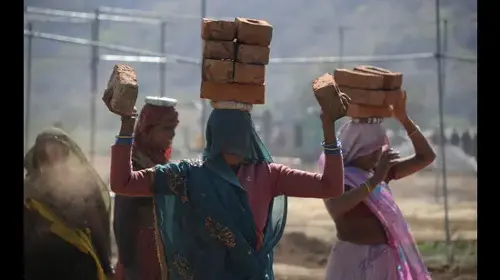
Farmers across Maharashtra are grappling with labour shortage, which they attribute to government welfare schemes providing free food and financial aid. Many say these schemes have caused shortfall of agricultural workers, driving up labour costs and affecting productivity.
Suresh Mahajan, a farmer from Taharabad in Nashik’s Satana taluka, said, “Schemes like free foodgrains for poor families, anganwadi meals, and the Ladki Bahin scheme have worsened labour crisis in agriculture. Since these families receive food and financial aid, they are unwilling to work on farms. Earlier, labourers worked for nearly a month; now, they show up for just a week.”
Mahajan claimed that these schemes have led to rise in alcohol consumption among male workers. “With less financial pressures, many prefer to stay at home, watch mobile videos, or drink, rather than work,” he said.
Kiran Thakre, another farmer, echoed similar concerns. “Labour charges in agriculture have nearly doubled. Farmers are struggling as male workers refuse to take up jobs, forcing us to hire women or bring in labourers from distant areas,” he said.
Contractors struggle to find farmhands
The impact of labour shortage is not limited to agriculture. It has disrupted infrastructure projects and industries in rural areas. Labour contractors, too, blame freebie schemes for the crisis.
Santosh Shivne, a labour contractor from Mangalwedha in Solapur district, said he has been forced to bring workers from Karnataka. “Due to schemes like Ladki Bahin, PM Kisan, Anandacha Shidha, Ujjwala, Shiv Bhojan, Gharkul, and subsidised grains, almost all basic needs of families are covered. Since their daily requirements are met, many labourers feel free to opt out of work,” he said.
Shivne clarified that he does not oppose welfare schemes, but emphasised need to address the declining labour availability in rural areas. “While these schemes help the poor, they have created unintended problems for industries and agriculture,” he said.
Farmers struggle with rising costs
Farmers in key agricultural belts, particularly in Nashik, where onion is a primary crop, are finding it difficult to sustain production.
Sanjay Desale, a farmer from Malegaon’s Pimpalgaon village, said, “Labour costs have shot up due to shortage. We have to send tractors or vehicles to pick up workers, and even then, there is no guarantee they will come.”
Sunil Ahire, an onion farmer from Nampur, said, “Earlier, both farmers and labourers worked hard in the fields. Now, landowners are the ones putting in effort, while many labourers prefer to stay home.”
Rupesh Sawant, another farmer, said these schemes have led to a shift in responsibilities within families. “Since their basic needs are taken care of, men send their wives to work while they remain at home drinking,” he alleged.
Traders, too, have observed changes in spending habits among rural workers. “Earlier, they spent on essentials like food, housing, and clothing. Now, they use their earnings to buy mobile data, accessories for their two-wheelers, and other wants,” said Yogesh Warkhede, a trader from Nampur.
Officials, activists weigh in
A senior IAS officer, speaking on condition of anonymity, acknowledged the unintended consequences of welfare schemes. “We cannot criticise government policies, but it is a fact that these schemes are negatively impacting agriculture, the workforce, and the economy. When people receive things for free, they often lose the motivation to work, leading to larger social issues,” he said.
Farmers’ leader and former MP Raju Shetti called for an immediate halt to such schemes. “These schemes are making people lazy and creating social problems. I am not against the poor, but their real needs are good education and healthcare. Instead of strengthening these sectors, the government is making people dependent on handouts. If a poor person falls ill, their entire economy collapses. The government should focus on health, education, and infrastructure, rather than handing out freebies that ultimately keep people in poverty,” he said.
However, activist Subhash Ware offered a broader perspective. “While these schemes contribute to the problem, the real issue is the agricultural crisis itself. Farming is not a stable source of employment due to water shortage and financial insecurity. If farmers themselves struggle financially, how can they provide stable jobs?” he said.
As the debate over freebie schemes continues, rural Maharashtra is witnessing an increasing struggle between farmers, labourers, and policymakers—one that could have long-term economic and social consequences.